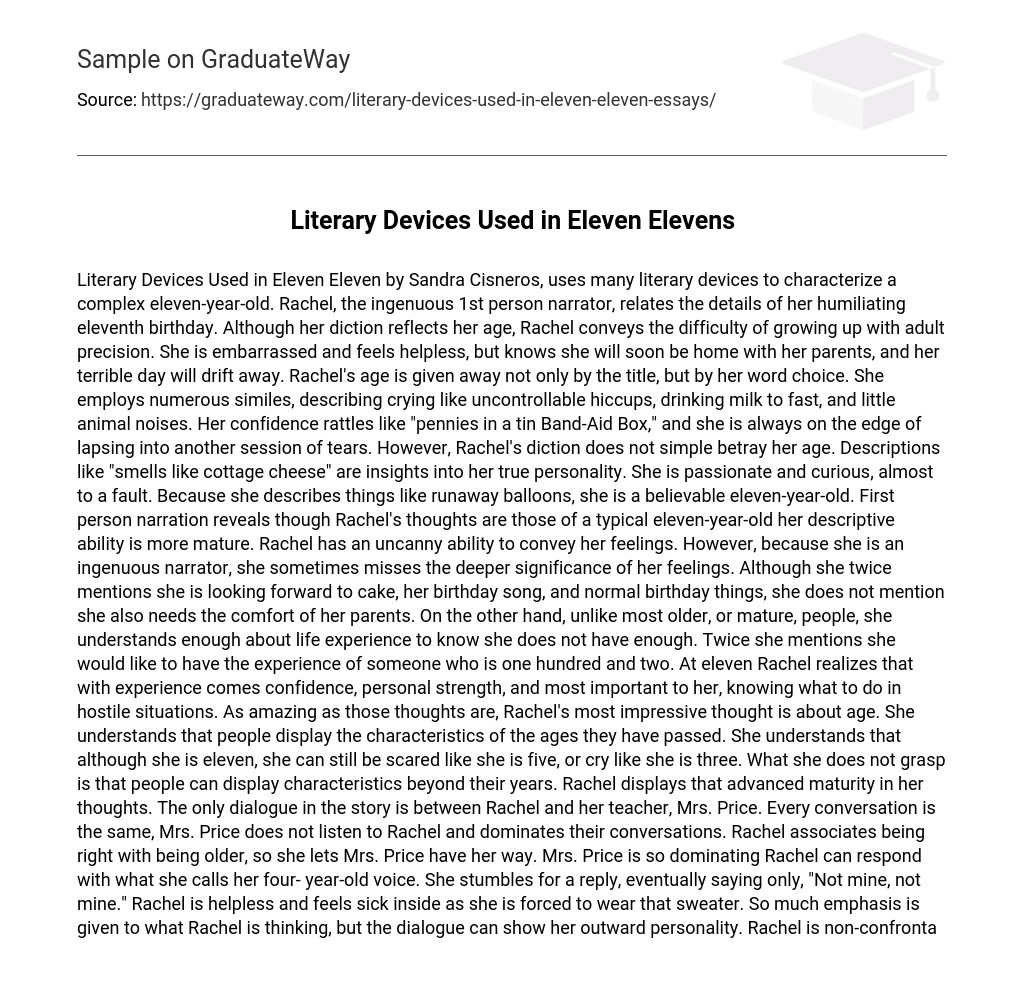Eleven Eleven, written by Sandra Cisneros, explores the character of an eleven-year-old through the use of various literary devices. The first-person narrator, Rachel, is portrayed as naive yet articulate, as she recounts the events of her humiliating eleventh birthday. Despite her young vocabulary, Rachel effectively communicates the challenges of maturing with the insight of an adult. While feeling ashamed and powerless, she takes solace in the knowledge that she will soon return to her parents and leave behind the troubles of her dreadful day.
Both the title and Rachel’s choice of words reveal her age. She uses several similes to describe crying, comparing it to uncontrollable hiccups, drinking milk too quickly, and making small animal noises. Her confidence is shaky, like “pennies in a tin Band-Aid Box,” and she is constantly on the brink of bursting into tears again. However, Rachel’s language does more than just reveal her age.
“The phrase ‘smells like cottage cheese’ offers a glimpse into her authentic persona. Her passion and curiosity are almost excessive, making her a convincing eleven-year-old due to her vivid descriptions, like that of escaping balloons. Although Rachel’s thoughts reflect the mindset of a typical eleven-year-old, her capability to describe things is remarkably mature. She possesses an exceptional talent for conveying her emotions. Nevertheless, as an innocent narrator, she occasionally overlooks the profound meaning behind her emotions.”
Although she mentions twice that she is eagerly anticipating cake, her birthday song, and typical birthday activities, she does not express the need for the comfort of her parents. However, unlike many older or mature individuals, she possesses enough understanding of life to recognize that her experiences are insufficient. She mentions twice that she desires to have the wisdom and insight of someone who is one hundred and two. At the age of eleven, Rachel comprehends that confidence, personal strength, and most significantly for her, the ability to handle hostile situations arise from life experience.
Rachel’s remarkable thoughts extend beyond the realm of imagination. One particularly noteworthy notion revolves around the concept of age. She comprehends that individuals exhibit traits that align with the ages they have traversed. For instance, despite being eleven years old, she recognizes that she can still experience fear reminiscent of a five-year-old or express emotions akin to a three-year-old. However, Rachel has yet to grasp the notion that individuals can exhibit characteristics surpassing their own chronological age. This advanced level of maturity shines through in her thoughts. The story solely presents dialogue between Rachel and her teacher, Mrs. Price.
Every conversation is the same, as Mrs. Price consistently fails to listen to Rachel and instead dominates their interactions. Rachel believes that being older equates to being correct, so she often allows Mrs. Price to have her way. Mrs. Price’s forceful nature is so overpowering that Rachel finds herself responding in what she refers to as her childlike voice. She struggles to find a suitable response and eventually settles for simply saying, “Not mine, not mine.”
Rachel is feeling helpless and physically ill because she has been compelled to wear a certain sweater. Although much attention is given to Rachel’s thoughts, her dialogue reveals her character traits of non-confrontation, timidity, and shyness. Desperately, Rachel wishes for her dreadful day to end. She longs to be 102 years old, hoping that days like this one will be a thing of the past.
After reluctantly putting on the sweater and being brought to tears, she undergoes a transformation, realizing that facing challenges is essential for personal growth. In Sandra Cisneros’s “Eleven”, the point of view, diction, dialogue, and symbolism contribute to portraying the coming of age of an eleven year old. Through these unique characteristics, the protagonist discovers valuable insights about the process of growing up.
Rachel not only survives her humiliation but also transforms into a smart eleven. She feels the immense intelligence of being eleven, achieving it almost a year earlier than expected. Rachel recognizes that individuals are the product of their past encounters. While she has an intense desire to be one hundred and two, she comprehends that her cumulative experiences amount to eleven.





